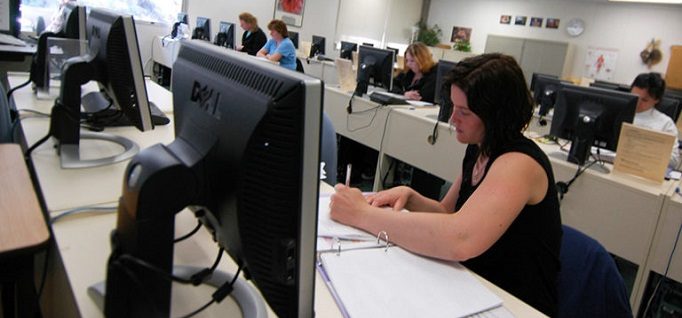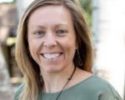Tapping tech in rural Oregon
By Jenn Kovitz
December 1, 2021
A college launched its mobile hotspot lending program to ensure students could access online classes and resources
In the arid canyonlands of central Oregon’s Crooked River Ranch community, the only internet Brandi Sneed could access was through her cellular network.
“We are living in our RV,” says the Central Oregon Community College (COCC) student and mother of two. “So we are not connected to any broadband.”
When the coronavirus pandemic forced Sneed to take her courses online, she tried to attend Zoom classes via her smartphone. But the connection was unreliable, and she could not see all her fellow classmates at once, nor could she watch the screen and participate in the chat function at the same time.
For the winter term, Sneed contacted the college’s Barber Library and checked out one of the available Chromebooks and a mobile hotspot, a small, portable device that provides wireless internet through a cellular network.
Like Sneed, many degree-seekers in central Oregon live in areas where they cannot access reliable internet. Others have children or family members whose own virtual priorities take precedence on a limited bandwidth. Many students lack the hardware necessary to log in to the college’s Zoom-based virtual classrooms, while others have no experience with remote learning technologies.
Partnering to offer hotspots
Because COCC serves a district of more than 10,000 square miles, the college knew it would require more than a simple solution to meet rural students’ needs, says Yasuko Jackson, COCC’s eLearning instructional coordinator. The college’s main campus is located in Bend, Oregon, with three additional branch campuses in Redmond, Madras and Prineville. Each is a 30- to 50-minute drive from the main campus.
Those rural communities were disproportionately impacted by the pandemic, and the college knew hotspots would be necessary for students whose homes don’t have easy access to the internet: Some students live in or near steep canyons or remote areas of the Warm Springs Reservation, where wi-fi access is nearly impossible.
The college’s library, together with the COCC Foundation and the eLearning and Information Technology Services (ITS) departments, collaborated to help solve these issues. Working with TechSoup, a nonprofit technology partner, COCC launched its mobile hotspot lending program. COCC’s Presidential Innovation Fund and existing departmental budgets purchased 33 hotspot devices for students, which the college library loans free of charge for a full term. The library also offers tablets, web cameras, graphing calculators and more; and it will deliver hardware to students’ homes if they can’t pick it up from the Bend campus.
More than hardware
The program has helped students drastically — both academically and socially. Sneed, who plans to complete her associate degree this spring and return to COCC in the fall to attend the new Community Health Worker program, says using the college’s devices has improved her learning experience — plus, the chat feature lets her keep in touch with other students.
“My old computer was so out-of-date, it would not run Office 365,” Sneed says. “Now I am using the loaned laptop and hotspot for all of my academics.”
Even with access to the library’s loaner hardware and campus computer labs, some students struggle with how to use remote learning technologies for the first time. To help, the college and the social science faculty launched a free, one-credit technology skills class, says Kristine Roshau, COCC’s director of eLearning. Supported by federal funding, the class introduces students to Zoom, Blackboard and pandemic-era time management and study skills. Class size is capped at 15 students.
“We need to ensure that technology enables learning opportunities rather than creates barriers for our students to overcome,” Roshau says.
COCC’s approach to remote learning technologies has had a huge impact on education. Darcy Webb, who is training to be a pharmacy technician, lives in the tiny town of Culver and works in Madras, Oregon. She primarily uses the computer lab to study and print out assignments and tests.
“Because of my access to the Madras campus computer lab,” Webb says, “I was able to continue my studies — and I made the winter dean’s list.”
This article is part of a monthly series provided by the National Council for Marketing & Public Relations, an affiliated council of the American Association of Community Colleges.



